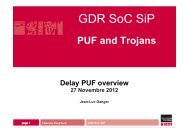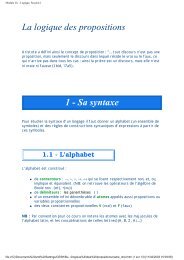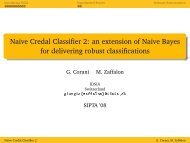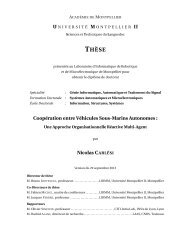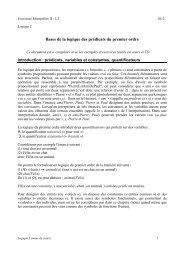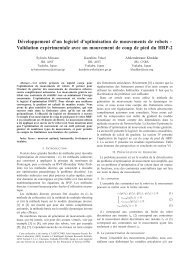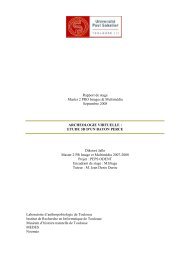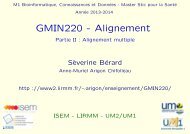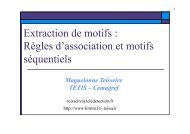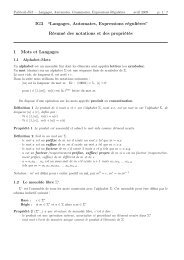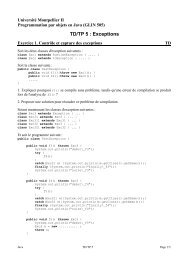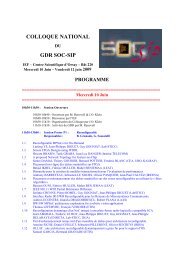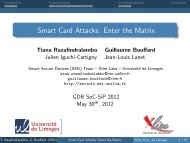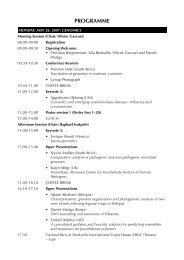Session WedAT1 Pegaso A Wednesday, October 10, 2012 ... - Lirmm
Session WedAT1 Pegaso A Wednesday, October 10, 2012 ... - Lirmm
Session WedAT1 Pegaso A Wednesday, October 10, 2012 ... - Lirmm
- TAGS
- pegaso
- october
- lirmm
- www2.lirmm.fr
Create successful ePaper yourself
Turn your PDF publications into a flip-book with our unique Google optimized e-Paper software.
<strong>Session</strong> WedGT3 <strong>Pegaso</strong> B <strong>Wednesday</strong>, <strong>October</strong> <strong>10</strong>, <strong>2012</strong>, 17:30–18:30<br />
Home Automation and Personal Robots<br />
Chair Stefano Mazzoleni, Scuola Superiore Sant'Anna<br />
Co-Chair<br />
17:30–17:45 WedGT3.1<br />
Acquisition and Use of Transferable,<br />
Spatio-Temporal Plan Representations for<br />
Human-Robot Interaction<br />
Michael Karg<br />
Institute for Advanced Study, Technische Universität München, Germany<br />
Alexandra Kirsch<br />
Department of Computer Science, University of Tübingen, Germany<br />
• Generation of semantically<br />
annototated spatial model by<br />
combining motion tracking data<br />
with information from semantic<br />
maps<br />
• Automatic segmentation of<br />
motion tracking data using<br />
spatial model<br />
• Generation of transferable,<br />
general, spatio-temporal plan<br />
representations for different<br />
tasks<br />
• Application: Passive plan<br />
supervision in different<br />
environments based on plan<br />
patterns and durations at<br />
semantically annotated locations<br />
18:00–18:15 WedGT3.3<br />
Context-aware Home Energy Saving based on<br />
Energy-Prone Context<br />
Mao-Yung Weng, Chao-Lin Wu, Ching-Hu Lu, Hui-Wen Yeh<br />
and Li-Chen Fu<br />
Department of Computer Science & Information Engineering,<br />
National Taiwan University, Taiwan, R.O.C.<br />
• Energy-prone context (EPC) is an<br />
activity with associated energy<br />
consumption.<br />
• EPC contains information about the<br />
necessity of an energy consumption to<br />
an activity.<br />
• We propose a systematic method to<br />
determine energy saving (ES) service<br />
based on EPC.<br />
• The potential of EPC-based ES system<br />
is 25% more effective than a locationbased<br />
one.<br />
An Energy-Prone Context<br />
using WatchTV as an example<br />
Activity: Watch TV<br />
Location: Livingroom<br />
Explicit:<br />
TV_livingroom|on|120watt|1.0<br />
Implicit:<br />
AC_livingroom|on|3000watt|0.75<br />
waterheater_bathroom|on|4000watt|<br />
0.56<br />
xbox_livingroom|standby|2watt|0.98<br />
lamp_livingroom|off|0watt|0.96<br />
light_hallway|off|0watt|0.88<br />
light_kitchen|off|0watt|1.0<br />
lamp_bedroom|off|0watt|0.86<br />
light_bedroom|off|0watt|0.9<br />
…..<br />
Living Room Light:<br />
on, 60w, 0.82<br />
TV:<br />
on, 120w, 1.0<br />
A/C:<br />
on, 3kw, 0.75<br />
Watch<br />
TV<br />
Water Heater:<br />
on, 4kw, 0.56<br />
Explicit power consumption<br />
Implicit power consumption<br />
xBox:<br />
standby, 2w, 0.98<br />
17:45–18:00 WedGT3.2<br />
Hierarchical Generalized Context Inference<br />
for Context-aware Smart Homes<br />
Chao-Lin Wu, Mao-Yuan Weng, Ching-Hu Lu and Li-Chen Fu<br />
Department of Computer Science & Information Engineering,<br />
National Taiwan University, Taiwan, R.O.C.<br />
• Hierarchical generalized context<br />
inference helps improve the<br />
performance of multi-user<br />
activity recognition.<br />
• A generalized context (GC) is an<br />
abstracted context composed of<br />
several contexts with common<br />
features.<br />
• This mechanism treats multiple<br />
users as an aggregated entity<br />
and hierarchically group<br />
contexts as GC.<br />
• Context-aware smart homes<br />
based on this method can<br />
provide appropriate services as<br />
much as possible.<br />
Context Labels<br />
Model Construction<br />
<strong>2012</strong> IEEE/RSJ International Conference on Intelligent Robots and Systems<br />
–186–<br />
GC(1)<br />
C (1,<br />
1)<br />
C (i,<br />
1)<br />
Training<br />
Phase<br />
Hierarchical Context<br />
Generalization<br />
GC(0)<br />
C (0, C (0, C (0, C(0, C (0,<br />
1) 2) 3) 4)<br />
…<br />
j)<br />
GC(i)<br />
…<br />
C (1,<br />
2)<br />
C(i,<br />
2)<br />
…<br />
DBN DBN DBN<br />
GC(0) GC(1)<br />
C (1,<br />
3)<br />
…<br />
…<br />
…<br />
GC(i)<br />
C (1,<br />
k)<br />
…<br />
C(i,<br />
m)<br />
Testing<br />
Phase<br />
Features<br />
Generalized<br />
Context<br />
Inference<br />
C(i,1) C(i,2) C(i,3) …<br />
…<br />
C(1,1<br />
)<br />
C(0,1<br />
)<br />
…<br />
C(1,2<br />
)<br />
C(0,2<br />
)<br />
…<br />
C(1,3<br />
)<br />
C(0,3<br />
)<br />
…<br />
…<br />
Generalized Contexts<br />
Hierarchical Generalized Context Inference Engine<br />
18:15–18:30 WedGT3.4<br />
Complex Task Learning from<br />
Unstructured Demonstrations<br />
Unstructured Demonstrations<br />
Scott Niekum, Sarah Osentoski, George Konidaris, and Andrew G. Barto<br />
• We present a novel method for segmenting<br />
demonstrations, recognizing repeated skills,<br />
and generalizing complex tasks from<br />
unstructured demonstrations.<br />
• This method combines many of the<br />
advantages of recent automatic segmentation<br />
methods for learning from demonstration into<br />
a single principled, integrated framework.<br />
• Specifically, we use the Beta Process<br />
Autoregressive Hidden Markov Model and<br />
Dynamic Movement Primitives to learn and<br />
generalize a multi-step task on the PR2<br />
mobile manipulator and to demonstrate the<br />
potential of our framework to learn a large<br />
library of skills over time.



